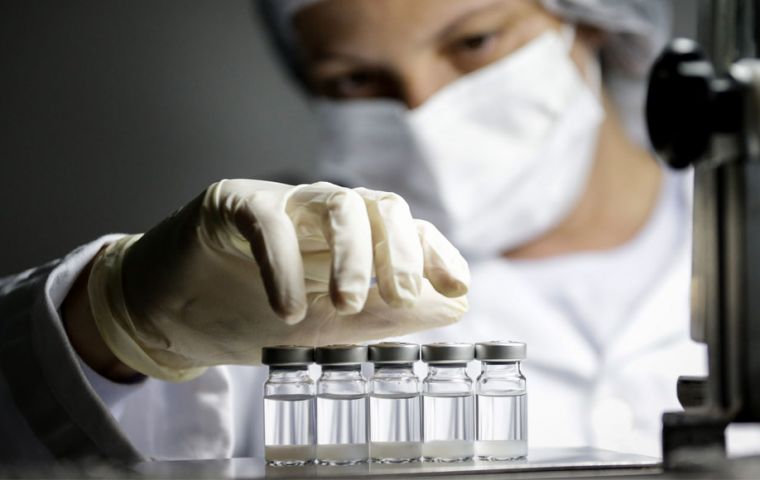MercoPress. South Atlantic News Agency
Brazil: 19 variants of coronavirus spot in Sao Paulo state, but Delta not one of them
 Eight million doses of ButanVac have already been produced for testing
Eight million doses of ButanVac have already been produced for testing Brazil's Butantan Institute has identified 19 variants of the SARS-CoV-2 that were circulating in the state of Sao Paulo, with the Gamma strain -formerly known as P.1 or Manaus- spotted to have a prevalence of 89.9%.
Researchers carried out genomic sequencing of part of the tests at the state's public and private laboratories between January and May 29.
“So far, 19 circulating variants have already been identified in the state of Sao Paulo” after ”sequencing 4,812 (0.58%) complete genomes of 834,114 (39.2%) positive cases,“ said Butantan's report, run by the state of Sao Paulo, the country's largest in terms of population.
Behind P.1 was Alpha or B.1.1.7 or Kent, identified for the first time in the United Kingdom, with an incidence of 4.2%.
However, there was no mention of the Indian variant Delta, which is the one that causes the greatest concern worldwide, although the strain has already been identified elsewhere within Brazil.
A new Butantan bulletin to be released weekly hopes to monitor “the absolute and relative frequencies of the SARS-CoV-2 lineages”, and “the temporal evolution of the incidence of the different strains” and gather information on “positive tests and diagnoses” regarding every area of the state.
Butantan also opened Wednesday the enrollment of volunteers for the ButanVac vaccine. The first phase of the study needs 418 people of legal age and need not be from within the health care sector.
Testing will be carried out at the Schools of Medicine of Ribeirão Preto and São Paulo. Phases ”B and C” will require more than 5,000 volunteers and will analyze their immune responses to vaccines.
“ButanVac is a development of an international consortium, Butantan is the largest producer of this consortium, already producing a large number of vaccines, and it is the vaccine version 2.0, it is evolution about the first generation of vaccines, not only from the point of view of the immune response but also of the productive platform. It is a vaccine that is made in the same productive way as the flu vaccine and this has enormous advantages: first, it can be available in large volume for the world and secondly is the cost. The cost is much lower than the vaccines that are currently being used”, said the Butantan head Dimas Covas.
According to state Governor João Doria (PSDB), 8 million doses of the immunizing agent have been produced and are kept in storage, another 40 million planned before the end of October.
The study will compare the immune response of ButanVac with other vaccines, being different from others, who used vaccines and placebos in participants. Placebos should only be applied in the first phase of the research. “The entire study is designed to last 17 weeks, but that doesn't mean it will last 17 weeks. As they are progressive phases, you depend on one phase to be able to evolve to another, and then you go on analyzing the response of each of these phases”, explained Covas. According to him, after the studies are completed - and depending on their results - the emergency use of the vaccine must be submitted to the National Health Surveillance Agency (Anvisa).




Top Comments
Disclaimer & comment rulesCommenting for this story is now closed.
If you have a Facebook account, become a fan and comment on our Facebook Page!